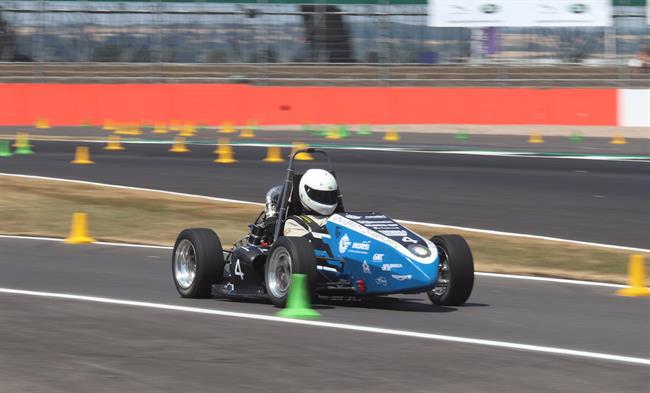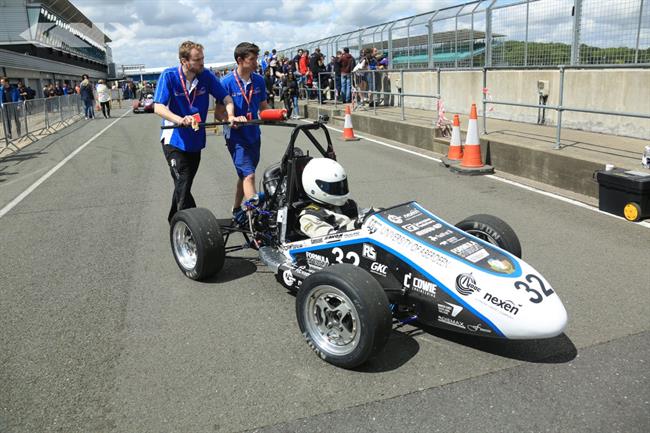How were you involved with the Formula Student competition?
My involvement with formula student spanned 5 years, competing in FSUK2014-18 with TAU Racing. To date, TAU Racing has exclusively produced internal combustion cars. I worked on our CBR600 F4i powered cars and the first two iterations of our Triumph 675 Daytona powered cars. During my tenure with TAU Racing, I held positions including Lead Powertrain Engineer and spent two years as the team’s Technical Director.
What made you join the competition?
For me, joining Formula Student came from a passion for motorsport and engineering in general. My family are big fans of the sport and I have always taken an interest in a wide range of motorsports. In conjunction with this was my passion for engineering, specifically in an automotive context. I am very hands on and like to apply my knowledge and skills - joining Formula Student gave me the opportunity to do this. As an extra benefit, it allowed me access to an industry recognised competition and the opportunity to interact with the industry long before graduating.
What was your biggest challenge during FS and how did you overcome it?
The biggest challenge during Formula Student was probably my first year as Technical Director of the team. I was in my 4th year (out of 5) at university and had my Individual Meng project to do along with running the technical side of the Formula Student team. That was the year we also switched to the Daytona 675 engine which meant a significant redesign of the package. To overcome this, we put in due diligent design processes, such as rapid prototyping, to ensure parts were safe, designed well and integrated into the new car before committing to final manufacture. Teamwork also played a big part. We had a strong management and design team that worked well together that year which showed off at competition when the team finished 4th overall. Personally, it was about managing time and resources. Making sure that my focus was on the areas that needed attention and tackling the issues when they arose. Ignoring something doesn’t make it go away. From an engineering perspective it was a challenge to go from being responsible for one area of the car to the whole vehicle. In this respect, there was no substitute for hard work. I did a lot of reading and made sure I understood my own decisions which made it easy to validate to others. Obviously not satisfied with my first year I went back and did it all again in my final year where I was able to implement lessons learnt from the first year to overcome the challenges for FSUK2018.
What's your current role and with which company?
Currently, I am a Graduate Powertrain Engineer with Aston Martin Lagonda (AML). The graduate scheme at Aston Martin is a fantastic development opportunity for young engineers. Currently, we [the grads] are all on rotations. We have the opportunity to do 4 x 3 months rotations around different departments to get a wider appreciation of how the business operates. When I return to my home department in 2020, I will be working with Powertrain Systems and, as such, will be responsible for the design of components and assemblies relating to such areas as intakes, exhaust, fuel system etc. One of the most enjoyable aspects of working with AML is that the company is relatively small, so you are given a large amount of responsibility quite quickly. This means that when you successfully complete a task there is usually an obvious impact that your work has had, or will have, which is very fulfilling. It also a very exciting time within the company as we look to expand our operations and move into new vehicle sectors; mid-engine and off-road.
How did your experiences at Formula Student help prepare you for your first role?
Formula Student can greatly assist in preparing you for your first role in industry. For me, having been part of management, I did a lot of external communication with sponsors and suppliers. The ability to hold a professional conversation is a vital skill irrespective of what career path you choose. The experience you get from Formula Student in this respect is almost unparalleled at University level. I, personally, do not know of another avenue that would have seen me in business discussions, with such large companies, at such a young age. From an engineering perspective, you get the opportunity to apply the full engineering process from conception, to design, through validation and integration checks, and finally manufacture and installation. When working in industry you will be working, most likely, as part of a larger programme that spans many areas. Pulling everything together is the largest challenge so any experience you can get in this area is extremely valuable and Formula Student is a great way to sample this.

What skills and knowledge do you see as essential for young engineers to succeed in their future careers?
There is no doubt about it, in today’s day and age it is essential to be comfortable with technology. That does not mean you need to understand every software out there, but you do have to understand how to use technology and apply it in an efficient manner. Its hard to pinpoint, in terms of specific knowledge, what areas are “essential” for young engineers. To blanket it, I would suggest any young engineer take quite an interest in Industry 4.0 and revolutionary manufacturing technologies. Industry 4.0 is the acknowledgement that we are going through our 4th industrial revolution and relates to the current overarching use of automation and data transfer in manufacturing technologies. It covers cyber physical systems which is probably one of the most rapidly developing sectors anywhere due to its cross applicability into different fields – just look at the use of 3D printing in medicine, for example, and how the developments can be shared in engineering and vice versa.
What advice would you give to young engineers seeking employment post-grad?
I cannot stress enough how important it is to apply for a role in a sector you enjoy. There is a lot of pressure on young professionals now to get a job straight out of University which can lead to mass applying to jobs without any real understanding of what you are applying for. I have been fortunate to secure what I would not hesitate to call my dream job, with a fantastic company, which makes all the difference when you start at 7:30am every morning. Formula Student will give you plenty to talk about in interviews. When talking about it in a scenario situation “tell me about a time when….” the best way to discuss Formula Student is in the STAR format - Situation, Task, Action, Result. This allows you to structure your answer and get all the information out without waffling. There is a good chance that what you are discussing spanned months of work and you might only have a few minutes or so to answer the question. When you are at competition, do not be shy and always act professional. The employers are there to meet you so go up and talk to them. Ask about the company, find out how the application process works and, if they aren’t already, get an indication of when applications are open or indeed how to apply – some companies only request a CV and cover letter emailed to a certain address, others will have more extensive online applications.

What is your fondest moment of the competition?
My best memory from competition has to be when, in 2017, TAU Racing took 4th place over all. The car ran pretty much as well as a team can hope for at competition and we passed scrutineering with a minimal amount of alteration the car. It had been a tough year implementing the new triumph engine with the whole car being redesigned, not iteratively as teams normally do, but almost entirely. It was a fantastic reward for team and brilliant start to the new era of Triumph powered TAU cars.